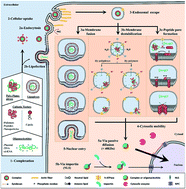Non-viral transfection vectors: are hybrid materials the way forward?
Abstract
Transfection is a process by which oligonucleotides (DNA or RNA) are delivered into living cells. This allows the synthesis of target proteins as well as their inhibition (gene silencing). However, oligonucleotides cannot cross the plasma membrane by themselves; therefore, efficient carriers are needed for successful gene delivery. Recombinant viruses are among the earliest described vectors. Unfortunately, they have severe drawbacks such as toxicity and immunogenicity. In this regard, the development of non-viral transfection vectors has attracted increasing interests, and has become an important field of research. In the first part of this review we start with a tutorial introduction into the biological backgrounds of gene transfection followed by the classical non-viral vectors (cationic organic carriers and inorganic nanoparticles). In the second part we highlight selected recent reports, which demonstrate that hybrid vectors that combine key features of classical carriers are a remarkable strategy to address the current challenges in gene delivery.



 Please wait while we load your content...
Please wait while we load your content...